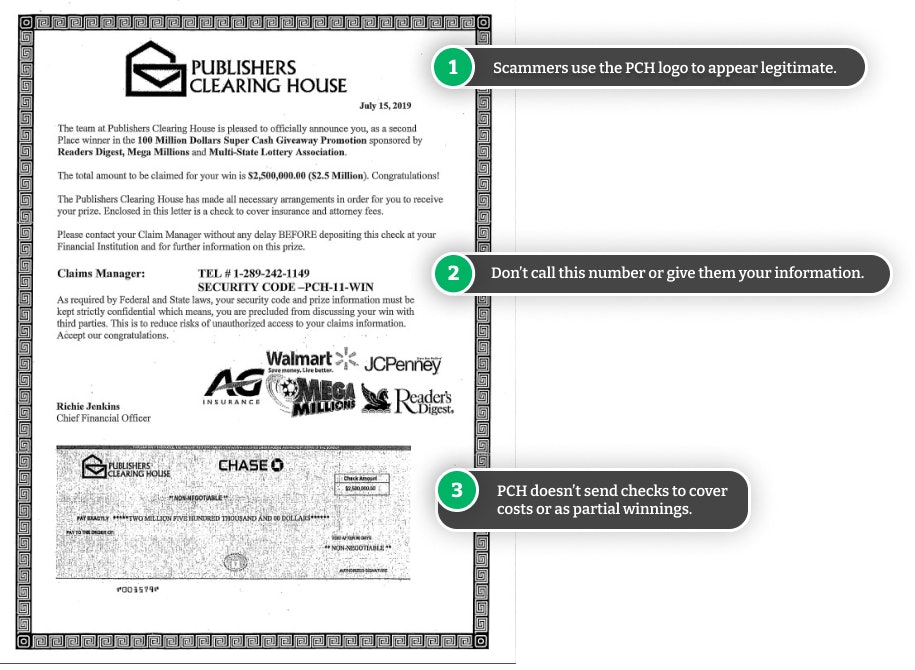- What Are Publishers Clearing House Fake Checks?
- How to Beat This Scam
- Signs of a Publishers Clearing House Fake Check
- What to do If You're a Victim of This Scam
- Frequently Asked Questions
We all dream of being handed over a big check—and no one makes them bigger than Publishers Clearing House (PCH). The company is famous for its giveaway sweepstakes, where they dole out millions of dollars in prizes on oversized checks. But unfortunately, scammers have figured out a way to make themselves the biggest winners of all, using Publishers Clearing House fake checks.
What Are Publishers Clearing House Fake Checks?
Consistent giveaways have made Publishers Clearing House one of the most famous sweepstakes out there, with the odds of winning the super-popular SuperPrize Giveaway coming to roughly one in 2.4 billion.
Still, some scammers have figured out a way to make people believe they’ve beaten those impossible odds and that the big check can be all theirs—for a small price.
Signs of a PCH Fake Check Scam
- Requirement to pay fees to receive your winnings.
- A check for less than the amount you've "won."
- Notification of your winnings via phone or email.
Here’s how the Publishers Clearing House fake check scam works.
You’re Contacted By a PCH Representative
Scammers may use a number of means to make contact with you, either by:
- Phone
- Social media (e.g., Facebook Messenger or Instagram)
Regardless of how they contact you, their general message will be the same. The scammer will claim to work for Publishers Clearing House and congratulate you on winning a sweepstakes prize.
Example Fake PCH LetterDear
The team at Publishers Clearing House is pleased to officially announce you, as a second place winner in the 100 Million Dollars Super Cash Giveaway Promotion sponsered by Readers Digest, Mega Millions and Multi-State Lottery Association.
The total amount o be claimed for your win is $500,000. Congratulations!
The Publishers Clearing House has made all necessary arrangements in order for you to receive your prize. Enclosed in this letter is a check to cover insurance and attorney fees.
Please contact your Claim Manager without any delay BEFORE depositing this check at your Financial Institution and for further information on this prize.
As required by Federal and State laws, your security code and prize information must be kept strictly confidential which means, you are precluded from discussing your win with third parties. This is to reduce risks of unauthorized access to your claims information. Accept our congratulations.
You’re Sent a Fake Check
The scammer will send you a check in the mail. This is supposedly the Publishers Clearing House check for winning the famous sweepstakes. It may look legit, but it’s actually a fake check, and you’ll have to jump through some hoops to claim your full prize.
The scammer may explain that you’re cashing in on just a portion of the prize and will need to send money (usually to cover taxes or other fees) to claim the rest. Or, you may be asked for personal information like your bank account number to complete the transaction.
In some cases, the scam letter may say the check enclosed is to help you pay attorney or insurance fees.

Scammers have gotten very good at imitating PCH letters over the years, but there are still a few ways to tell a Publishers Clearing House fraud check from a real one.
The company will never send you a check for partial payment of your winnings. Scammers will often only send a check (a fake one) for a small portion of the entire winnings and require you to pay a fee to receive the remainder. This is a sign of a scam.
You Cash the Check and Send Money
At this point, you take the check to the bank.
Under federal law, most banks will make any funds you deposit available quickly—within one to five days—whether or not the check is valid. So when you cash the fraudulent check, it will appear that the funds are available, at least until the bank discovers it’s a fake.
Since the money has shown up in your bank account, you may believe the check is real. You follow the instructions to send a portion of the money back to the scammer to claim the rest of your winnings.
The Check Bounces
Unfortunately, it can take several weeks for reality to catch up to the banks, but eventually, they will realize that you deposited a bad check.
This will not only result in you losing out on the money you supposedly won but potentially paying penalties for cashing a bad check. And the scammer will walk away with whatever funds you sent them, free of charge.
How to Beat This Scam
The simplest way to beat this scam is not cashing Publishers Clearing House fraud checks or sending money to receive a PCH prize.
Of course, that’s easier said than done, but there are a few ways to recognize a real Publishers Clearing House check from a fake one.
PCH will never ask for:
- Your bank account or other personal information.
- A processing fee, tax, or special handling charge.
- You to wire money, send a prepaid gift card, or use a Green Dot MoneyPak card.
- You to cash a check and send a portion back as payment to claim your sweepstakes prize.
All Publisher Clearing House winnings are entirely free and come without any strings attached.
Additionally, if you win PCH sweepstakes, they will never inform you via:
- Social media
- Text
- Phone call
PCH will only inform you of winning in person or by mail.
Signs of a Publishers Clearing House Fake Check
Other common red flags of PCH sweepstakes scams include:
- Demands for payment to claim a prize.
- Use of free email accounts to contact you.
- Being told you won a contest that you didn’t enter.
- Pressure to act fast to claim your prize.
- Requests for bank or credit card information to claim your prize.
- Any typos, poor grammar, or strange turns of phrase.
If you’ve received a letter with a Publishers Clearing House check and you’re still unsure whether it’s legitimate, you can always contact PCH directly and ask for further information.
Publishers Clearing House
It's important to verify links and contact details to beat imposters.
What to do If You're a Victim of This Scam
As scammers have become more sophisticated, it’s become easier to fall for their scams.
If you believe you received a Publishers Clearing House fraud check, you can and should report the incident:
- Directly to Publishers Clearing House by filling out a Scam Incident Report.
- To the authorities, including:
- Your local police
- The Internet Crime Complaint Center (IC3)
- To your bank or financial institution and report any fraudulent activity
- The Federal Trade Commission (FTC)


Comments